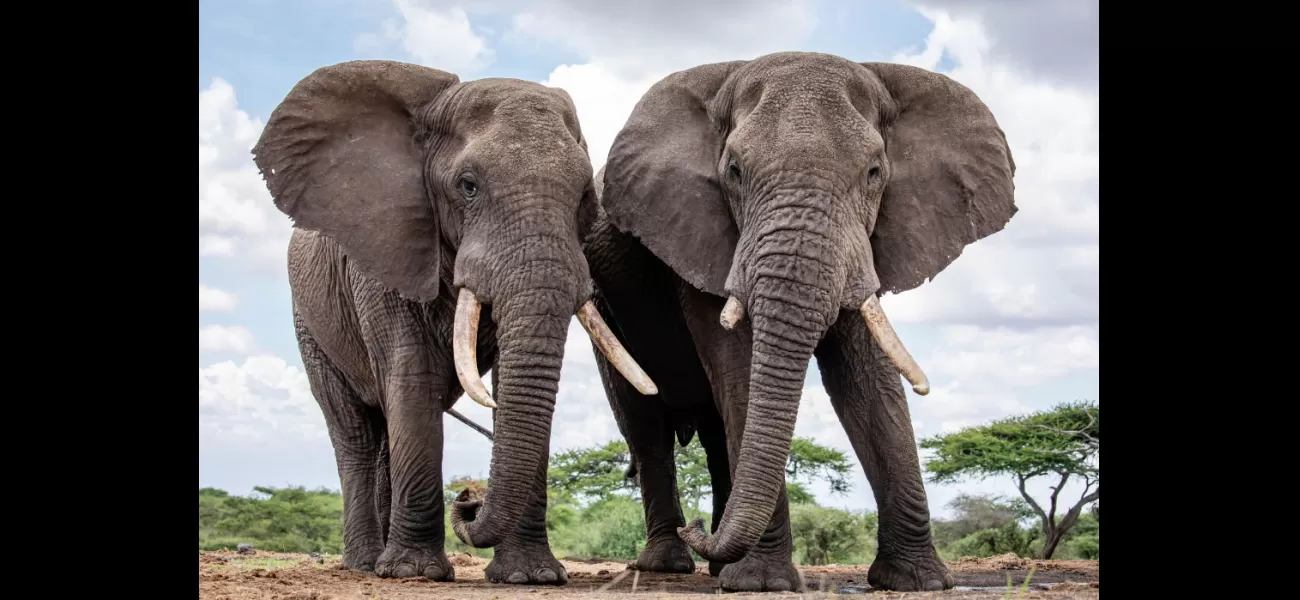A new study shows that African elephants have individual names they use to communicate with each other.
New study shows large animals communicate with unique names.
June 11th 2024.

New research has revealed that African elephants have the ability to call each other by individual names, a behavior that is rarely seen in wild animals. This discovery sheds light on the complex social structures and family dynamics of these majestic creatures.
The names used by elephants are actually a part of their low rumbles, which can be heard over long distances across the savanna. This makes sense, as elephants often need to communicate with each other even when they are far apart. It's like having a built-in walkie-talkie system!
According to scientists from the United States, animals that have intricate social structures and frequently separate and reunite may be more likely to use individual names. As ecologist Stuart Pimm from Duke University puts it, "If you're taking care of a large family, you definitely need to be able to call out to specific individuals. For example, you might say, 'Hey, Virginia, get over here!'"
It's not common for wild animals to use unique names for each other. We humans have names, and our furry friends like dogs also respond when we call out to them. Baby dolphins even create their own names called signature whistles, while parrots may also use names.
Interestingly, all of these species that exhibit naming behavior also have the ability to learn new sounds throughout their lives. This is a rare talent that elephants also possess, which could explain their use of individual names.
To conduct the study, biologists used machine learning to analyze a library of savanna elephant vocalizations recorded in Kenya's Samburu National Reserve and Amboseli National Park. By observing the elephants in jeeps, the researchers could determine who was calling out and who responded. For example, they could see if a mother called out to her calf, or if the matriarch called out to a straggler who later rejoined the family group.
Using audio data alone, the computer model was able to accurately predict which elephant was being addressed 28% of the time. This is likely due to the inclusion of individual names in the vocalizations. When meaningless data was fed into the model, it only accurately identified calls 8% of the time.
Study author and biologist Mickey Pardo from Cornell University explains, "Just like humans, elephants use names, but they don't use them in every single utterance. So we wouldn't expect a 100% accuracy rate." This shows that while elephants do have names, they may not use them all the time.
It's worth noting that elephant rumbles include sounds that are below the range of human hearing. So, researchers are still unsure which part of the vocalization is the actual name. To further test their results, they played recordings to individual elephants and observed their responses. The elephants became more alert and even showed physical reactions like flapping their ears and lifting their trunks when they heard recordings that contained their names. They also ignored vocalizations that were addressed to other elephants, proving that they can distinguish their own names.
If you want to stay updated on all the latest news, celebrity gossip, and sports updates, follow us on our WhatsApp channel. No comments, no algorithm, and your privacy is protected. Join us now!
The names used by elephants are actually a part of their low rumbles, which can be heard over long distances across the savanna. This makes sense, as elephants often need to communicate with each other even when they are far apart. It's like having a built-in walkie-talkie system!
According to scientists from the United States, animals that have intricate social structures and frequently separate and reunite may be more likely to use individual names. As ecologist Stuart Pimm from Duke University puts it, "If you're taking care of a large family, you definitely need to be able to call out to specific individuals. For example, you might say, 'Hey, Virginia, get over here!'"
It's not common for wild animals to use unique names for each other. We humans have names, and our furry friends like dogs also respond when we call out to them. Baby dolphins even create their own names called signature whistles, while parrots may also use names.
Interestingly, all of these species that exhibit naming behavior also have the ability to learn new sounds throughout their lives. This is a rare talent that elephants also possess, which could explain their use of individual names.
To conduct the study, biologists used machine learning to analyze a library of savanna elephant vocalizations recorded in Kenya's Samburu National Reserve and Amboseli National Park. By observing the elephants in jeeps, the researchers could determine who was calling out and who responded. For example, they could see if a mother called out to her calf, or if the matriarch called out to a straggler who later rejoined the family group.
Using audio data alone, the computer model was able to accurately predict which elephant was being addressed 28% of the time. This is likely due to the inclusion of individual names in the vocalizations. When meaningless data was fed into the model, it only accurately identified calls 8% of the time.
Study author and biologist Mickey Pardo from Cornell University explains, "Just like humans, elephants use names, but they don't use them in every single utterance. So we wouldn't expect a 100% accuracy rate." This shows that while elephants do have names, they may not use them all the time.
It's worth noting that elephant rumbles include sounds that are below the range of human hearing. So, researchers are still unsure which part of the vocalization is the actual name. To further test their results, they played recordings to individual elephants and observed their responses. The elephants became more alert and even showed physical reactions like flapping their ears and lifting their trunks when they heard recordings that contained their names. They also ignored vocalizations that were addressed to other elephants, proving that they can distinguish their own names.
If you want to stay updated on all the latest news, celebrity gossip, and sports updates, follow us on our WhatsApp channel. No comments, no algorithm, and your privacy is protected. Join us now!
[This article has been trending online recently and has been generated with AI. Your feed is customized.]
[Generative AI is experimental.]
0
0
Submit Comment





